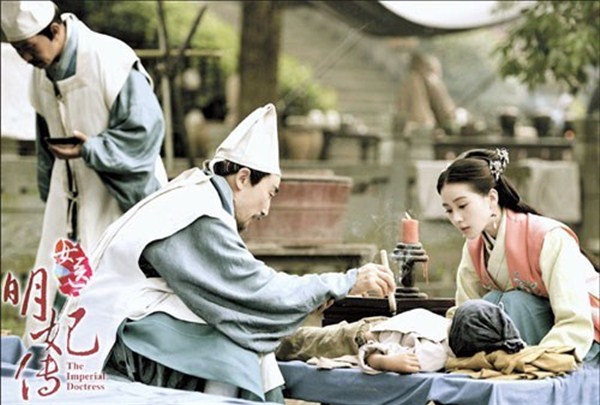
今日上海
电视剧《女医明妃传》掀中医热 - 2016年04月08日
'Imperial Doctress' saves lives — on TV

STELLA Li used to have no interest in traditional Chinese medicine. Then the 26-year-old got hooked on the hit TV series "The Imperial Doctress" featuring a heroic female traditional Chinese medicine physician who saves lives and initiates a female physician system in the Ming Dynasty (1368-1644). Li can now name quite a number of traditional Chinese medicine herbs and believes to know how they are used.
Apart from advising her pregnant colleagues to soak their feet in mugwort decoction, Li now also plans to make her own qi bai gao (七白膏), literally "seven-white cream," the best weapon for any skin blemishes, according to the TV show.
"There are a lot of seemingly strange traditional Chinese medicine therapies used by the heroine, with magic effects and easy practice," says Li, "I did not intentionally record them all, but just happened to remember some therapies which I think might be practical in daily life."
Many period dramas have led to fads of traditional Chinese culture. They've included traditional dresses, particular martial arts, traditional etiquettes or wording, and, more recently, traditional Chinese medicine.
Musk and safflower was all the rage when "The Legend of Zhenhuan" was shown on TV, and more traditional Chinese medicine herbs like tu fu ling (土茯苓), or Smilax officinalis), and wu wei zi (五味子), the fruit of Chinese magnoliavine, rose to prominence thanks to the drama "The Legend of Miyue." "The Imperial Doctress" is almost a televised encyclopedia of common and uncommon traditional Chinese medicine therapies.
Though an official notice informed viewers that the therapies were used to support the plot rather than to give medical advice, some fans have started to adapt them.
"I don't think the recipes are all fictional, as I have heard about some similar recipes from older generations before," says 31-year-old Amy Wang, the mother of a two-month-old baby who plans to use e jiao (阿胶), made of donkey skin, to treat blood deficiency.
Many recipes used in the TV series are inspired by traditional Chinese medicine classics or real recipes widely used before the introduction of modern medicine, but often, their effects are exaggerated, according to Dr Jiang Zaifeng, registered traditional Chinese medicine physician based in Hong Kong. Dr Jiang highlighted the importance of understanding that information provided on TV is not necessarily good medical advice in real life.
"As Mencius put it, to believe everything in books is worse than to have no books at all. In this case, I would say that to believe everything in the TV series is even worse than to believe everything in books, since TV series are basically for entertainment rather than for imitation," Dr Jiang said.
To provide some clarity, Dr Jiang offered comments on some of the recipes in the TV series:
1. Piercing 10 finger tips to relieve stroke
In "The Imperial Doctress," the heroine pierces the fingertips of an elderly lady who is suffering from a stroke and saves her life.
Letting blood on the shi xuan (十宣)acupuncture points was widely used as first aid treatment for strokes in the old times, according to Dr Jiang. But that was centuries ago, when it took a long time for patients to get immediate medical treatment.
Times have changed, and Dr Jiang insists that this cannot work for each case of stroke. He strongly recommended seeking immediate medical attention at a hospital.
2. Spread the ash of incense on wounds to stop bleeding
In "The Imperial Doctress," residents collect the ashes of burnt incense from a Buddhist temple and use them to stop bleeding.
In TCM, a prescription named shi hui san (十灰散), or "10 ashes medicinal powder," is composed of burned ashes of 10 herbs like lotus leaves, biota tops and rheum officinale, and is said to stop bleeding.
But the ancient treatment can backfire. The large number of germs in the ash can cause inflammation, Dr Jiang says. "Besides, why bother getting dirty ash when a clean band-aid can help stop the bleeding?" he says.
3. Musk causes miscarriages and infertility
In "The Legend of Zhenhuan," the heroine has a miscarriage after using a scar-removing cream mixed with musk that was given to her by a wicked imperial concubine. Another concubine never conceived since the incense she used for years were mixed with musk.
Musk can help improve blood circulation, remove stagnation and relieve pain in joints, according to TCM.
Pregnant women are advised not to use musk because it could cause uterine contractions, but it has never been connected to fertility issues and there is no proof that it will result in infertility, according to Dr Jiang.
4. Tiepi shihu (铁皮石斛), or officinale dendrobe, can safe lives.
In "The Imperial Doctress," the heroine talks about officinale dendrobe, saying that it can safe lives and is even more powerful than ginseng.
It is true that officinale dendrobe was listed as one of the nine "fairy herbs" in China in the book "Dao Zang" ("Taoist Classics").
It is definitely not an all-mighty herb, but it can help nourish yin (cold) energy, dispel pathogenic heat, and support your digestive system.
5. Ginseng prolongs your life
Ginseng is probably the most popular traditional Chinese medicine herb in many TV series. When a character is deadly injured or terminally ill, a more than 1,000 years old ginseng will help him or her recover.
Ginseng is a precious herb that can boost your energy, but it won't cure serious disease, said Dr Jiang.
Patients with poor digestion should be cautious in using the herb, and it is not recommended for children and teenagers.

